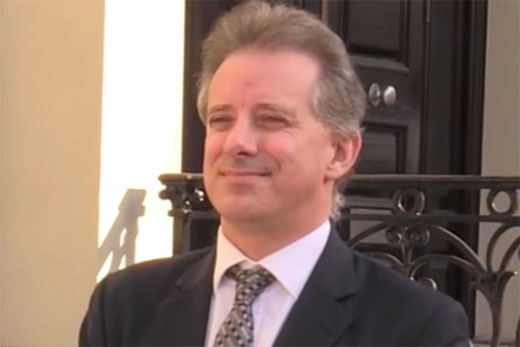by WorldTribune Staff, March 3, 2020
In obtaining the fourth and final wiretap warrant to spy on Trump campaign associate Carter Page, the FBI ignored anti-Trump dossier author Christopher Steele’s own admission in court that at least part of his dossier was based on mere gossip, a report said.
Steele, in a sworn declaration on April 3, 2017 in a London court, admitted that at least one of the memos that made up his dossier was “unsolicited” and “raw” intelligence. But the FBI still used the dossier as its key evidence in obtaining the FISA warrant to spy on page, Rowan Scarborough reported for The Washington Times on March 1.

The Washington Times first disclosed the Steele court document on April 25, 2017. Republicans later told the Department of Justice that Steele’s admission in court should have set off alarm bells inside the FBI about the ex-British spy’s credibility.
All four FBI wiretap affidavits on Page never would have been sought without the Democratic Party-funded dossier, according to DOJ Inspector General Michael Horowitz.
Horowitz disclosed in his Dec. 9 report that the FBI showed no interest in acquiring records from Steele’s court case for use in obtaining the FISA warrants to spy on Page.
Horowitz said that although there had been “open source reporting … We found no evidence that the FBI made any attempts in May or June 2017 to obtain the filings to assist a determination of whether to change the FBI’s assessment …”
The FBI’s Office of the General Counsel (OGC) made the unilateral decision to ignore Steele’s court filing, the Horowitz report said: “The OGC unit chief’s notes suggest that on May 1, without consulting [DOJ], and relying only upon open source reporting concerning the filings, the FBI decided that Steele’s April 3, 2017 sworn statement in the foreign litigation did not warrant any changes to renewal application No. 3.”
In January, based on Horowitz’s report, the DOJ nullified the last two FISA warrants.
Steele is scheduled to stand trial in mid-May in a defamation case.
Steele’s court flings came in the case of Russian computer entrepreneur Aleksej Gubarev, who filed a defamation lawsuit against Steele and his Orbis Business Intelligence almost immediately after BuzzFeed published the 35-page dossier on Jan. 10, 2017.
The dossier accused Gubarev of hacking Democratic Party computers under pressure from Russian intelligence.
The Mueller report does not mention Mr. Gubarev. The report said the hacking was exclusively carried out by the Russian military.
Val Gurvits, Gubarev’s U.S. attorney, told The Washington Times that a London trial date is tentatively set for May 15.
“We think the London trial is going to be very illuminating,” Gurvits said. “Steele has not pleaded ‘truth’ as a defense to the claims in London and there’s good reason for that, with respect to the claims about Gubarev and his companies, the allegations are complete nonsense. We knew that from the start, but it’s taken a long time for the truth to come out.”
Gurvits told The Times: “The Mueller report identified the real culprits in the hacking of the DNC and then the Inspector General’s report showed that much of Steele’s ‘reporting’ was based on ‘Internet rumor’ and ‘hearsay.’ It’s crazy that Steele and Orbis and Fusion GPS are still trying to pretend otherwise.
“You shouldn’t be allowed to trash someone’s reputation based on gossip and rumors, but that’s exactly what happened when Steele wrote it. Buzzfeed decided it was OK to simply dump all this on the Internet and say, ‘who knows if it’s true.’ It wasn’t true. That’s not reporting. And we’re confident that Gubarev and his companies will be completely vindicated in London.”
Intelligence Brief __________ Replace The Media
